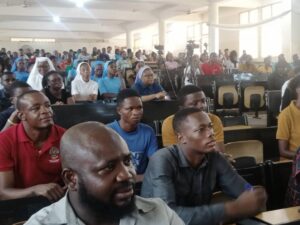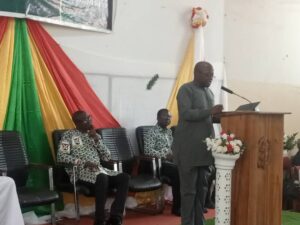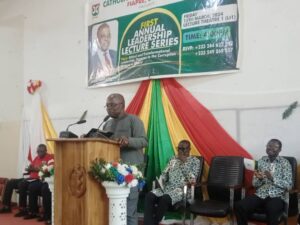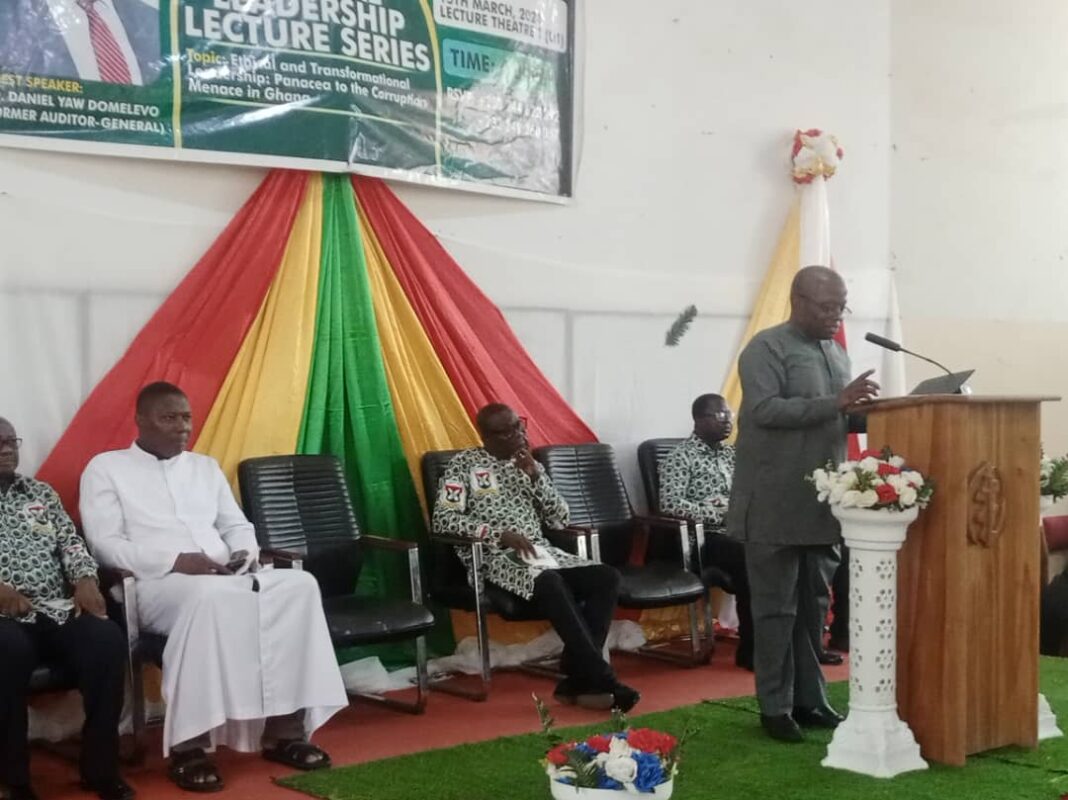Mr. Daniel Yaw Domelevo, Ghana’s former Auditor General has cautioned Universities in Ghana especially the Catholic University of Ghana not to allow corruption to take the central stage of the institution and society at large.
Speaking on the topic “Ethical and transformational leadership: Panacea to the Corruption Menace in Ghana” at the maiden annual leadership series of the Catholic University of Ghana, Fiapre near Sunyani on Friday, March 15, he said could undermine “our ability to provide basic services, feeds inequality into the society and breeds injustice.”
The University intends to set high academic standards and radically transform the educational environment of Ghana, by inculcating high moral standards and imparting gospel values to students in their integral formation in the course of their university education.

According to Mr. Domelevo, he saw corruption as the deadliest disease that had ever attacked Ghana, lamenting that monies meant for a hospital facility can pocketed by one person leading sometimes to the death of many citizens.
He noted that many have also lost their lives on our roads due to its poor or bad nature and queried: “As a country, we all know that corruption is not good for us, but why are we not fighting it, or why is it difficult to fight it?
According to him, one of the reasons why corruption cannot be fought is that people are living in an era that says the end justifies the means, once you are rich, it is ok, it does not matter how you became rich.
Noting that fighting corruption was dangerous, he said if one tries to fight corruption, corruption will fight the person back, calling on all to fight corruption and “if we do not know how to fight it, we should look and learn from other examples.”

He stated that people have made attempts to fight corruption and all are capable except that “we have ‘give it to God syndrome. In situations where we are supposed to fight, we sit and fold our arms, and watch.”
He challenged the Catholic University students to help eradicate corrupt practices and abuse of office as well as eschew both corruption and waste of resources.
“All our resources must be put to good use. We can do that through a good financial management system, strategic allocation of resources, efficient service delivery, and meritocracy, he said.
Another control measure in the public sector, he mentioned was asset and liability declaration, stating that “Every public officer starting from the president must declare their asset to the Auditor General before they assume office and when they are leaving office.”
According to the former Auditor General, “When this is being carried out well, it will help to curtail corruption in the country,” adding, “The state should commercialize the fight against corruption.”

This, he indicated could help accountants, lawyers, etc come together and register their firm to fight corruption.
Touching on “Ethical and transformational leadership”, he said it was one of the greatest tools that can be used to fight corruption.
“We need to have ethical and transformational leadership. Doing what is right is the call of being an ethical leader. Being a transformational leader on the other hand is the type of leadership that brings about significant and positive changes in the individuals and the social system,” Mr. Domelevo said.
He implored the students and University authorities to assume some leadership qualities that he has summed up in an acronym called FATHER, saying as a leader, you must be “Fair, Accountable, Trustworthy, Honest, Equitable and Respectful.
Mr. Daniel Yaw Domelevo is a professional accountant. He holds an executive master’s degree in Business administration (Finance) from the Business School of the University of Ghana since 2002. He is also the chairman of the Accountancy Practice Review Committee of the Institute of Chartered Accountants (Ghana). He is also a member of the Audit and Finance Committee of the Global Fund where he represents the West and Central Africa Constituency of the fund.
The Catholic University of Ghana was established by the Ghana Bishops’ Conference (GCBC) in 2002 to build on the reputation of the church as a provider of holistic quality higher education across the world and to make a fundamental contribution to the delivery of quality tertiary education in Ghana.
Sr. Naomi Obour Addai, HHCJ



